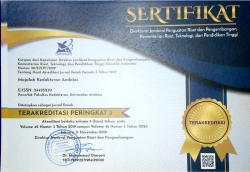TERAPI ANTIVIRAL PADA SIROSIS HATI DEKOMPENSATA TERKAIT INFEKSI VIRUS HEPATITIS B
Abstract
Keywords
Full Text:
PDFReferences
Lok ASF, McMahon BJ. Chronic Hepatitis B: update 2009. Hepatology 2009;50(3):1-36
Liaw YF, Leung N, Kao JH, Pirathvisuth T, Gane E, Han KH, et al. Asian-Pacific consensus statement on the management of chronic hepatitis B: a 2008 update. Hepatol Int. 2008;2:263-83.
Chu CM, Liaw YF. Hepatitis B virus-related cirrhosis: natural history and treatment. Semin Liver Dis. 2006;26: 142-52.
Keeffe EB, Dieterich DT, Han SB, Jacobson IM, Martin P, Schiff ER, et al. A treatment algorithm for the management of chronic hepatitis B virus infection in the United States: 2008 update. Clin Gastroenterol Hepatol. 2008;6:1315-41.
Yao FY, Terrault NA, Freise C, Maslow L, Bass NM. Lamivudine treatment is beneficial in patients with severely decompensated cirrhosis and actively replicating hepatitis B infection awaiting liver transplantation: a comparative study using a matched, untreated cohort. Hepatology. 2001;34:411–16.
Schiff E, Lai CL, Hadziyannis S, Neuhaus P, Terrault N, Colombo M, et al. Adefovir dipivoxil therapy for lamivudine-resistant hepatitis B in pre- and post-liver transplantation patients. Hepatology. 2003;38:1419–27.
Villeneuve JP, Condreay L, Willems B, Pomier-Layrargues G, Fenyves D, Bilodeau M, et al. Lamivudine treatment for decompensated cirrhosis resulting from chronic hepatitis B. Hepatology .2000;31:207–10.
Zoulim F, Perrillo RP. Hepatitis B: reflections on the current approach to antiviral therapy. J Hepatol. 2008;48 (Suppl 1):S2-S19.
Iloeje UH, Yang HI, Su J, Jen CL, You SL, Chen CJ. Predicting cirrhosis risk based on the level of circulating hepatitis B viral load. Gastroenterology. 2006;130:678-86.
Sorrell MF, Belongia EA, Costa J, Gareen IF, Grem JL, Inadomi JM, et al. National Institutes of Health Consensus Development Conference Statement: management of hepatitis B. Ann intern Med. 2009;150:104-10.
Dienstag JL, Schiff ER, Wright TL, Perrillo RP, Hann HW, Goodman Z, et al. Lamivudine as initial treatment for chronic hepatitis B in the United States. New England Journal of Medicine. 1999; 341(17):1256–63.
Kapoor D, Guptan RC, Wakil SM, Kazim SN, Kaul R, Agarwal SR, et al. Beneficial effects of lamivudine in hepatitis b virus-related decompensated cirrhosis. Journal of Hepatology. 2000;33(2):308–12.
Yao FY, Bass NM. Lamivudine treatment in patients with severely decompensated cirrhosis due to replicating hepatitis b infection. Journal of Hepatology. 2000;33(2): 301–07.
Schiff E, Lai CL, Hadziyannis S, Neuhaus P, Terrault N, Colombo M, et al. Adefovir dipivoxil for wait-listed and post-liver transplantation patients with lamivudine-resistant hepatitis B: final long-termresults. Liver Transplantation. 2007;13(3):349–60.
Lai CL, Leung N, Teo EK, Tong M, Wong F, Hann HW, et al. A 1-year trial of telbivudine, lamivudine, and the combination in patients with hepatitis B e antigen-positive chronic hepatitis B. Gastroenterology. 2005; 129(2): 528–36.
Gane EJ, Chan HL, Choudhuri G. Treatment of decompensated HBV-cirrhosis: results from 2-years randomized trial with telbivudine or lamivudine. Journal of Hepatology. 2010;52:S4.
Leung N, Peng CY, Hann HW, Solano J, Lao-Tan J, Hsu CW, et al. Early hepatitis B virus DNA reduction in hepatitis B e antigen-positive patients with chronic hepatitis B: a randomized international study of entecavir versus adefovir. Hepatology. 2009;49(1):72–9.
Tenney DJ, Rose RE, Baldick CJ, Pokornowski KA, Eggers BJ, Fang J, et al. Long-term monitoring shows hepatitis B virus resistance to entecavir in nucleoside-naıve patients is rare through 5 years-of therapy. Hepatology. 2009;49(5): 1503–14.
Seo YS, Jung FS, Kim JH. Lamivudine versus entecavir in patients with hepatitis B virus related decompensated liver cirrhosis. Journal of Hepatology. 2010;50: 550A.
Heathcote J, Gane EJ, De Man RA, Chan S, George J, Tsai N, et al. Long term (4 year) efficacy and safety of tenofovir disoproxil fumarate (TDF) treatment in HBeAg positive patients with chronic hepatitis B (Study 103): a preliminary analysis. Hepatology. 2010;50:556A.
Gallant J, Staszewski ES, Pozniak AL, DeJesus E, Suleiman JM, Miller MD, et al. Efficacy and safety of tenofovir DF vs stavudine in combination therapy in antiretroviralnaive patients: a 3-year randomized trial. Journal of the American Medical Association. 2004; 292(2):191–201.
Peters MG. Special populations with hepatitis B virus infection. Hepatology. 2009;49:S146-S155.
Lampertico P, Del Ninno E, Vigano M, Romeo R, Donato M, Sablon E, et al. Long term suppression of hepatitis B e antigennegative chronic hepatitis B by 24-month interferon therapy. Hepatology. 2003;37:756–63.
Perrillo R, Tamburro C, Regenstein F, Balart L, Bodenhemier H, Silva M, et al. Low-dose, titratable interferon alfa in decompensated liver disease caused by chronic infection with hepatitis B virus. Gastroenterology. 1995;109:908–16.





















